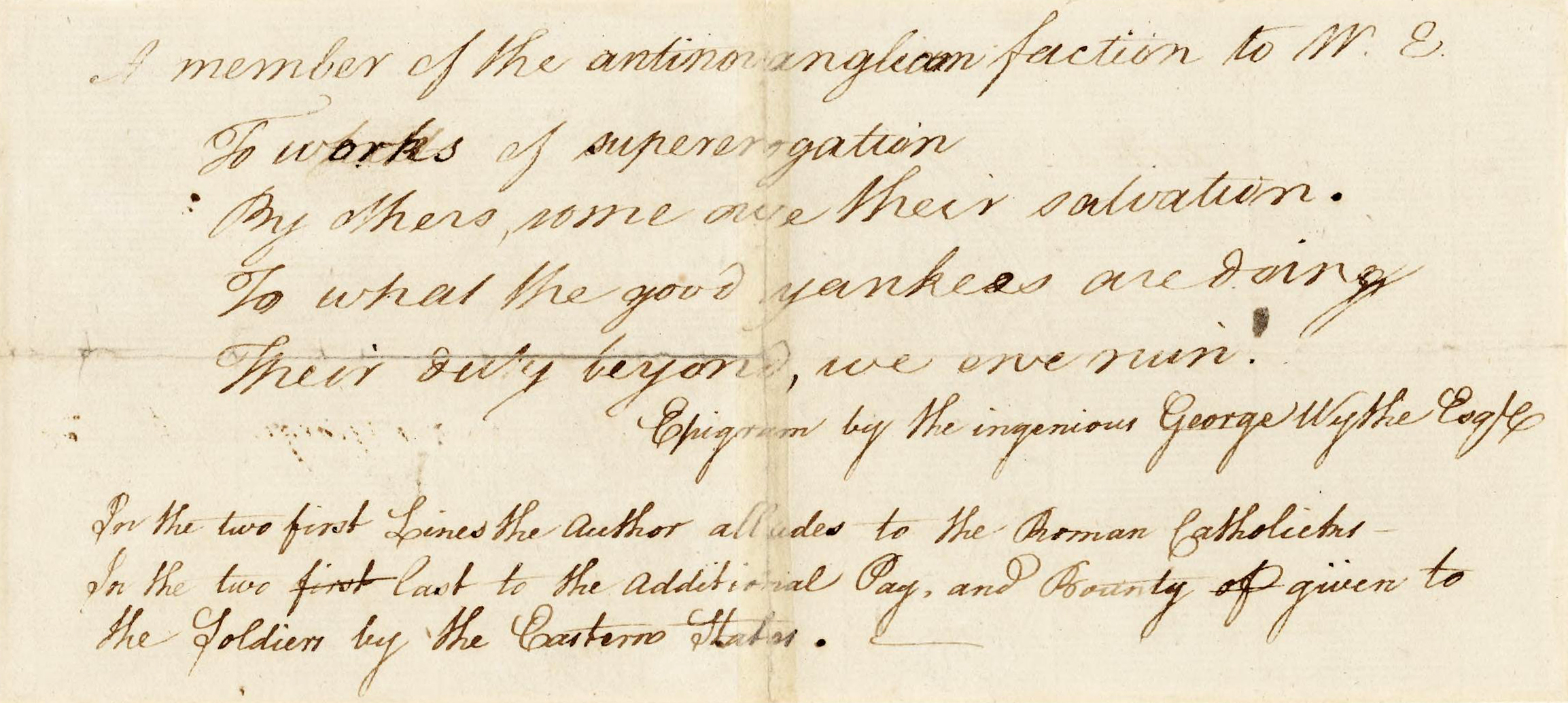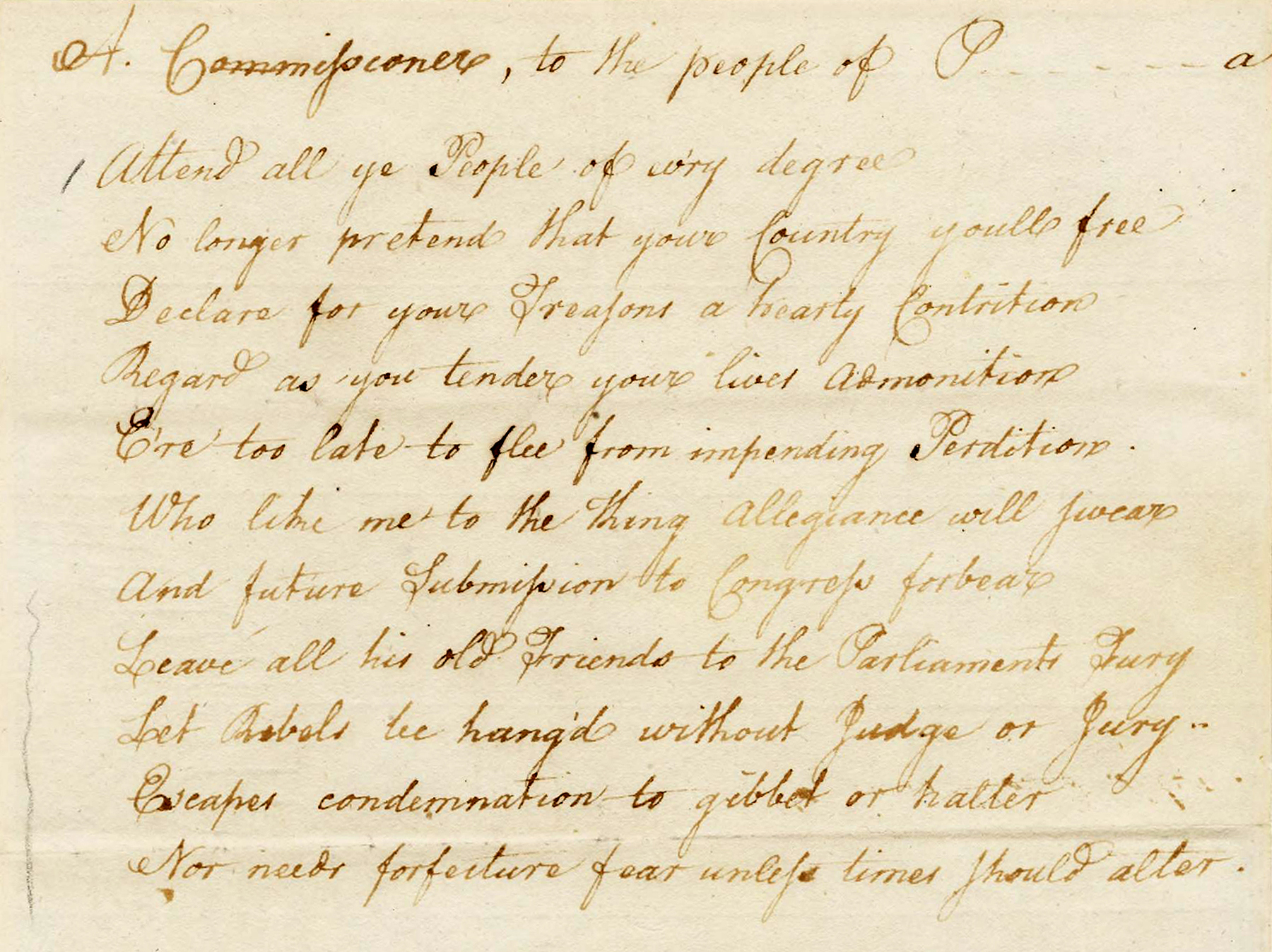Difference between revisions of "Poems on Witty Subjects in Congress"
| Line 1: | Line 1: | ||
| − | [[File:PoemsOnWittySubjectsInCongressP6.jpg|thumb|300px|Wythe and Ellery exchanged verses on pieces of scrap paper, as evidenced by the reverse of " | + | [[File:PoemsOnWittySubjectsInCongressP6.jpg|thumb|300px|[[George Wythe]] (VA) and William Ellery (RI) exchanged verses on pieces of scrap paper, as evidenced by the reverse of "Instead of Controlling Our Mary's Cross Humor," which was part of a document addressed to "The Hon. William Ellery, Delegate for the State of Rhode Island, in Continental Congress, Philadelphia." From the [https://www.bpl.org/ Boston Public Library's] [https://archive.org/details/bplscarwm American Revolutionary War Manuscripts Collection.]]] |
George Wythe and William Ellery, ''[http://bpl.bibliocommons.com/item/show/2837995075_poems_on_witty_subjects_in_congress Poems on Witty Subjects in Congress],'' American Revolutionary War Manuscripts Collection, Boston Public Library, MS.Ch.E.8.31-33.<ref>See W. Edwin Hemphill, "[[Media:HemphillGeorgeWytheCourtsTheMusesJuly1952.pdf|George Wythe Courts the Muses]]," ''William and Mary Quarterly'' 3rd ser., 9, no. 3 (July 1952), 338-345.</ref> | George Wythe and William Ellery, ''[http://bpl.bibliocommons.com/item/show/2837995075_poems_on_witty_subjects_in_congress Poems on Witty Subjects in Congress],'' American Revolutionary War Manuscripts Collection, Boston Public Library, MS.Ch.E.8.31-33.<ref>See W. Edwin Hemphill, "[[Media:HemphillGeorgeWytheCourtsTheMusesJuly1952.pdf|George Wythe Courts the Muses]]," ''William and Mary Quarterly'' 3rd ser., 9, no. 3 (July 1952), 338-345.</ref> | ||
| Line 277: | Line 277: | ||
| | | | ||
[[File:PoemsOnWittySubjectsInCongressP11.jpg|thumb|600px|Page eleven from [https://archive.org/details/poemsonwittysubj00elle ''Poems on Witty Subjects in Congress,''] from the [https://www.bpl.org/ Boston Public Library's] [https://archive.org/details/bplscarwm American Revolutionary War Manuscripts Collection.]]] | [[File:PoemsOnWittySubjectsInCongressP11.jpg|thumb|600px|Page eleven from [https://archive.org/details/poemsonwittysubj00elle ''Poems on Witty Subjects in Congress,''] from the [https://www.bpl.org/ Boston Public Library's] [https://archive.org/details/bplscarwm American Revolutionary War Manuscripts Collection.]]] | ||
| + | |} | ||
| + | |||
| + | ===Martial, Epigram XVII, in Wythe's hand=== | ||
| + | |||
| + | {| style="margin-bottom: 20px;" | ||
| + | |- style="vertical-align: top;" | ||
| + | | | ||
| + | {| | ||
| + | | style="width: 500px; white-space: nowrap; margin: 20px 0 20px 20px; background-color: #f9f7e0; border: 1px solid #000000; padding: 20px 50px;" | | ||
| + | In all thy humour, whether grave or mellow,<br /> | ||
| + | Thou'rt such a touchy, testy, fellow,<br /> | ||
| + | Hast so much mirth, and wit, and plen about thee,<br /> | ||
| + | There is no living with thee, or without thee.<br /> | ||
| + | |||
| + | <blockquote>I remember to have seen | ||
| + | this translation of an | ||
| + | epigram of Martial.</blockquote> | ||
| + | |} | ||
| + | | | ||
| + | [[File:PoemsOnWittySubjectsInCongressP13.jpg|thumb|600px|Page thirteen from [https://archive.org/details/poemsonwittysubj00elle ''Poems on Witty Subjects in Congress,''] from the [https://www.bpl.org/ Boston Public Library's] [https://archive.org/details/bplscarwm American Revolutionary War Manuscripts Collection.]]] | ||
|} | |} | ||
Revision as of 15:37, 16 April 2014
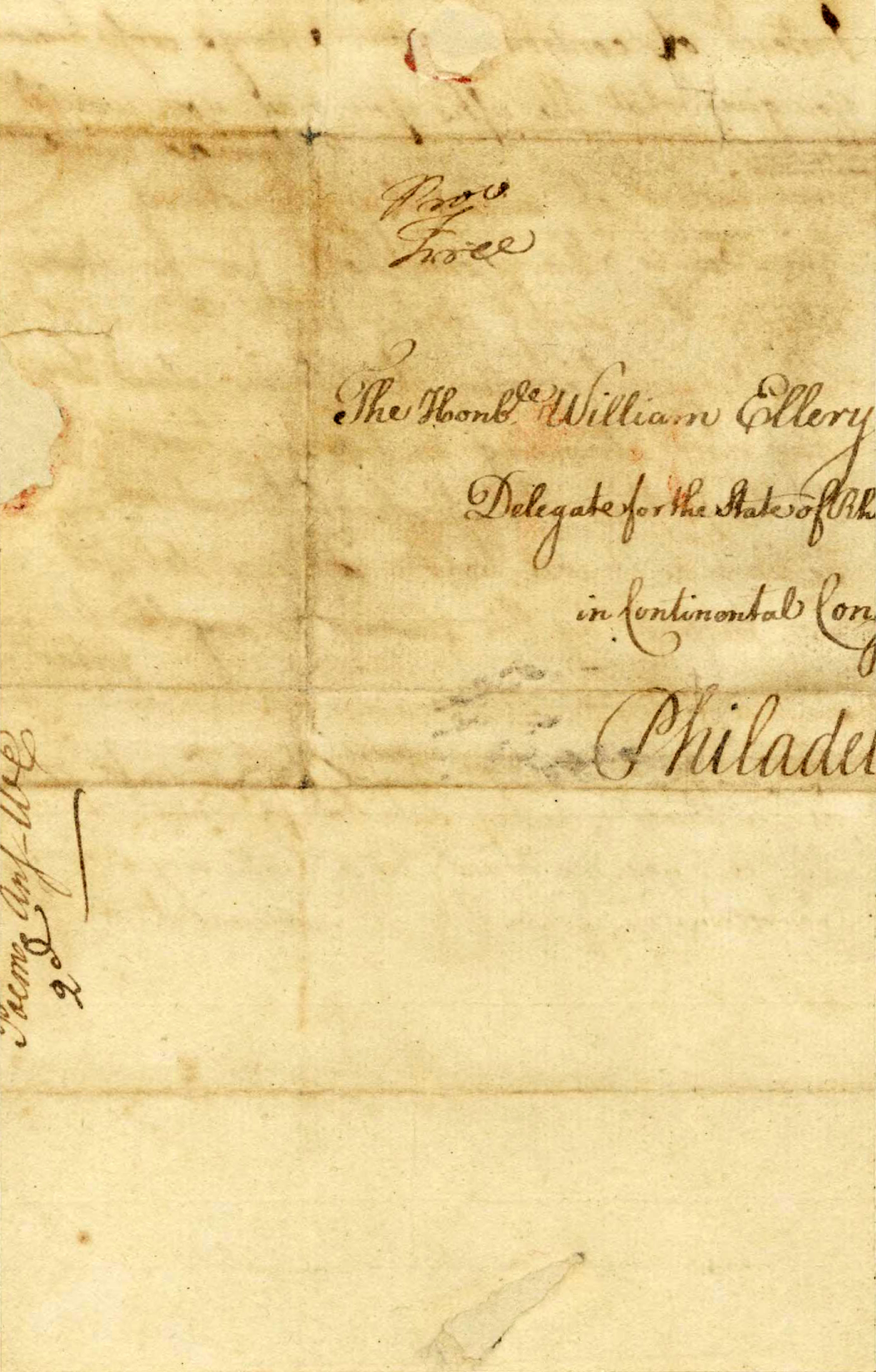
George Wythe and William Ellery, Poems on Witty Subjects in Congress, American Revolutionary War Manuscripts Collection, Boston Public Library, MS.Ch.E.8.31-33.[1]
Contents
- 1 Manuscript text, November-December 1776
- 1.1 "A Member of the Antinovanglian Faction to W. E.," by George Wythe (VA)
- 1.2 "A Novanglican to G.W.," by William Ellery (RI)
- 1.3 "Instead of Controlling Our Mary's Cross Humor," by William Ellery
- 1.4 "For Farms in Utopia, the Moon, or Some Fairyland," by George Wythe
- 1.5 With One Epigram, Though Well Hit Off" by George Wythe
- 1.6 "Unless You Will Take One Line for Your Ten," by William Ellery
- 1.7 "You've Not only Quitted Your Arrear," by George Wythe
- 1.8 "The Gen'rous Idea Your Last Piece Expresses," by William Ellery
- 1.9 Copy of Ellery's epigram, in Wythe's hand
- 1.10 Martial, Epigram XVII, in Wythe's hand
- 1.11 "A Commissioner, to the People of Philadelphia," by William Ellery
- 2 See also
- 3 References
- 4 External links
Manuscript text, November-December 1776
"A Member of the Antinovanglian Faction to W. E.," by George Wythe (VA)
|
"A Novanglican to G.W.," by William Ellery (RI)
|
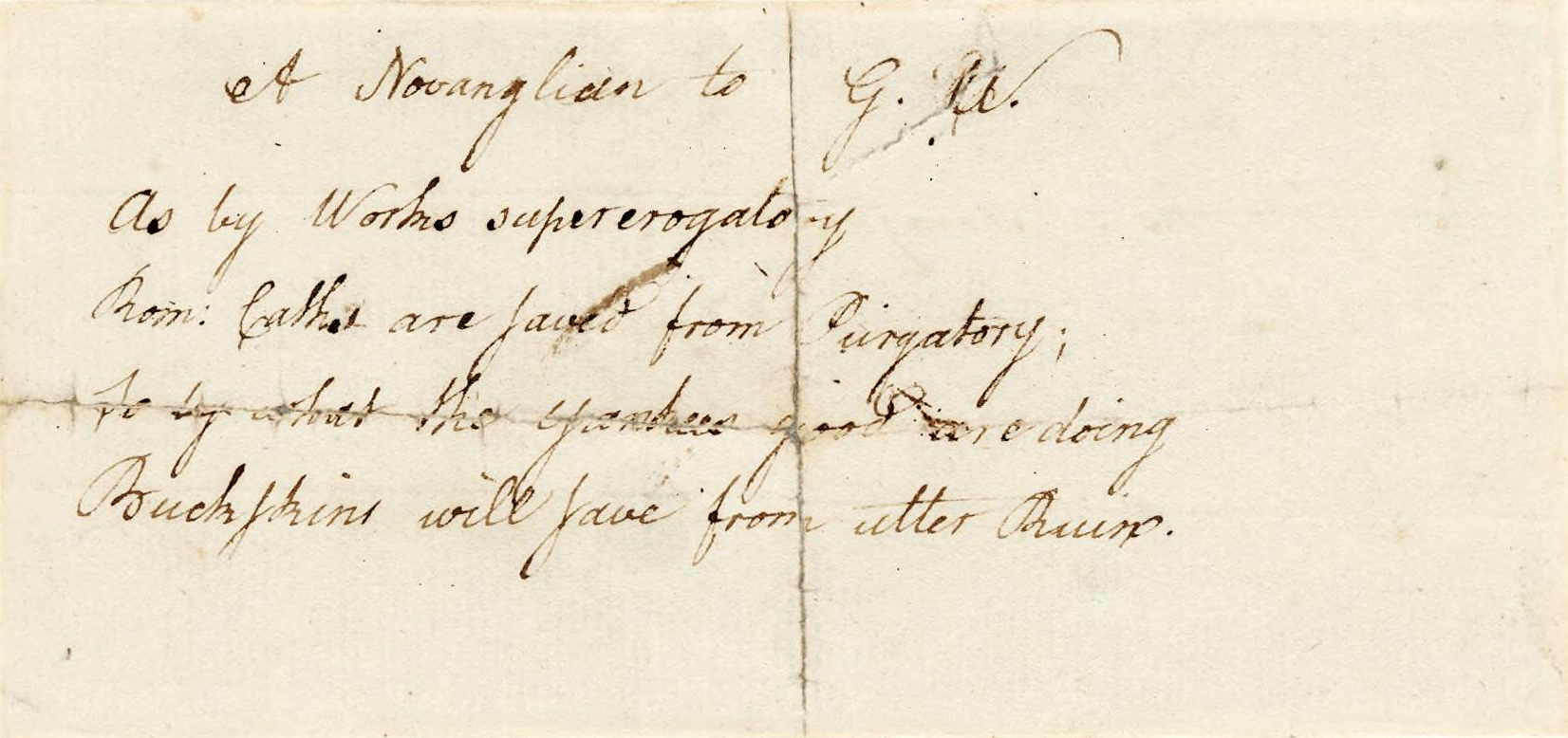 Page three from Poems on Witty Subjects in Congress, from the Boston Public Library's American Revolutionary War Manuscripts collection. |
"Instead of Controlling Our Mary's Cross Humor," by William Ellery
|
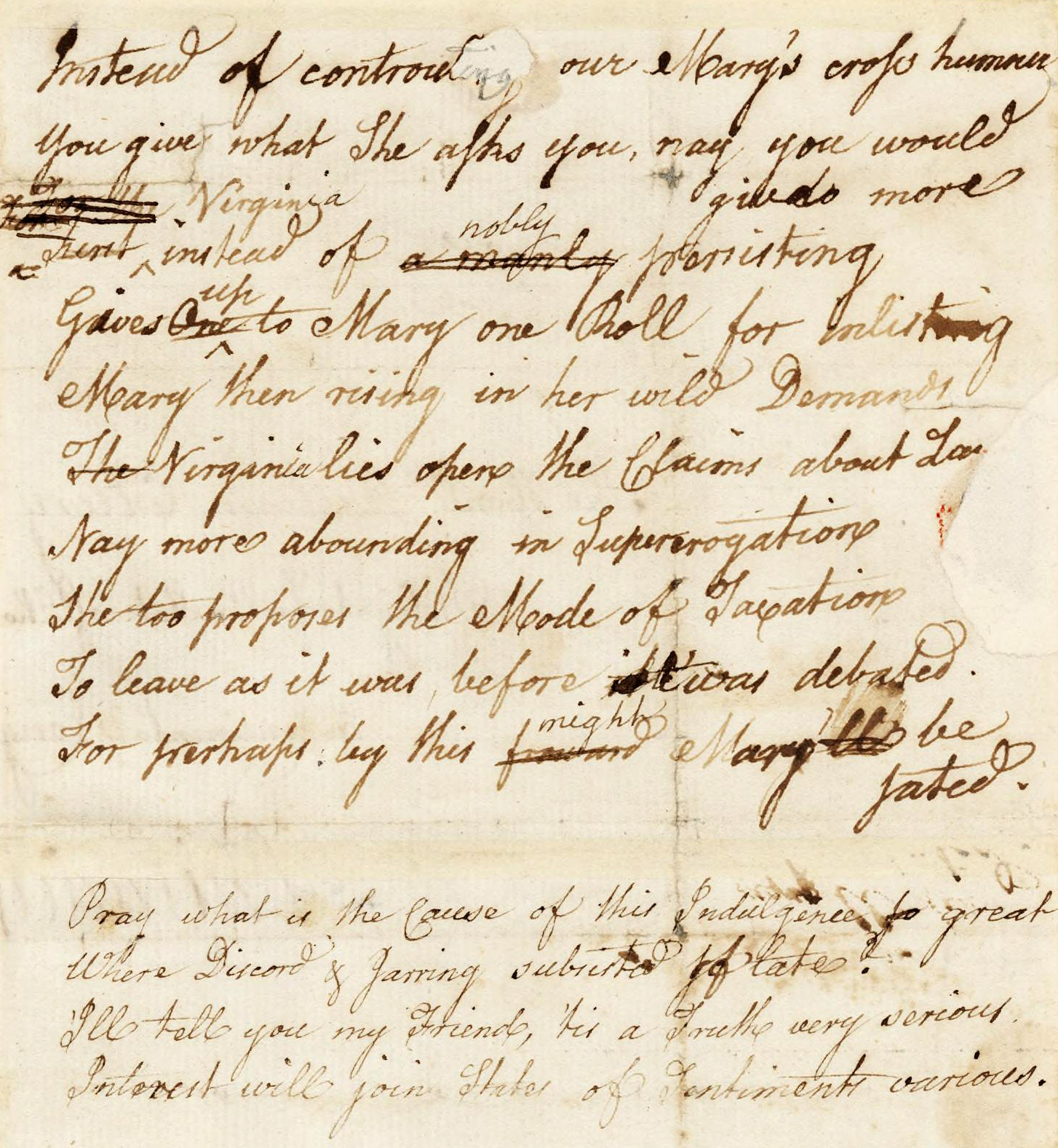 Page five from Poems on Witty Subjects in Congress, from the Boston Public Library's American Revolutionary War Manuscripts Collection. |
"For Farms in Utopia, the Moon, or Some Fairyland," by George Wythe
|
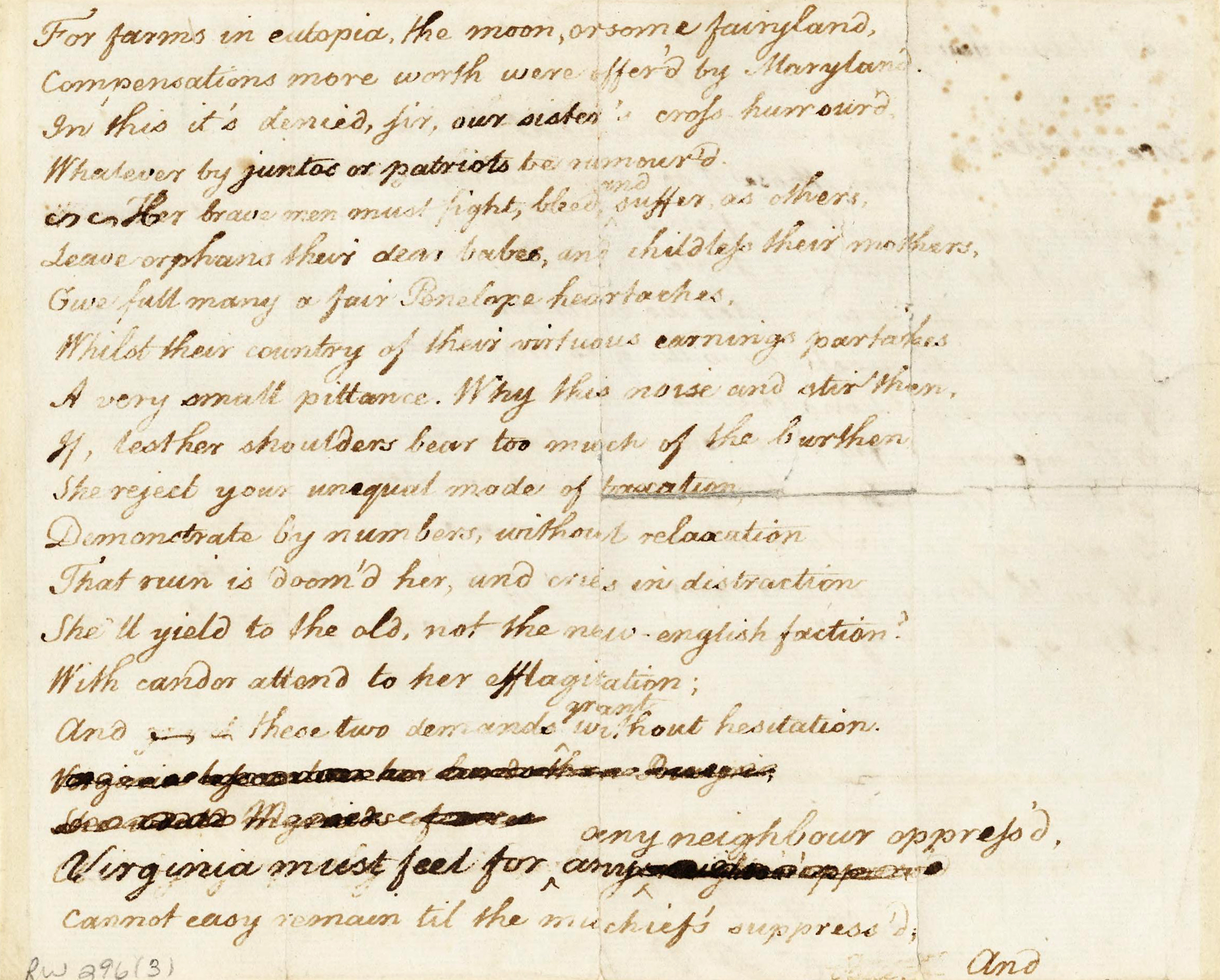 Page nine from Poems on Witty Subjects in Congress, from the Boston Public Library's American Revolutionary War Manuscripts Collection. | |
|
And if slaves you include in your capitation, |
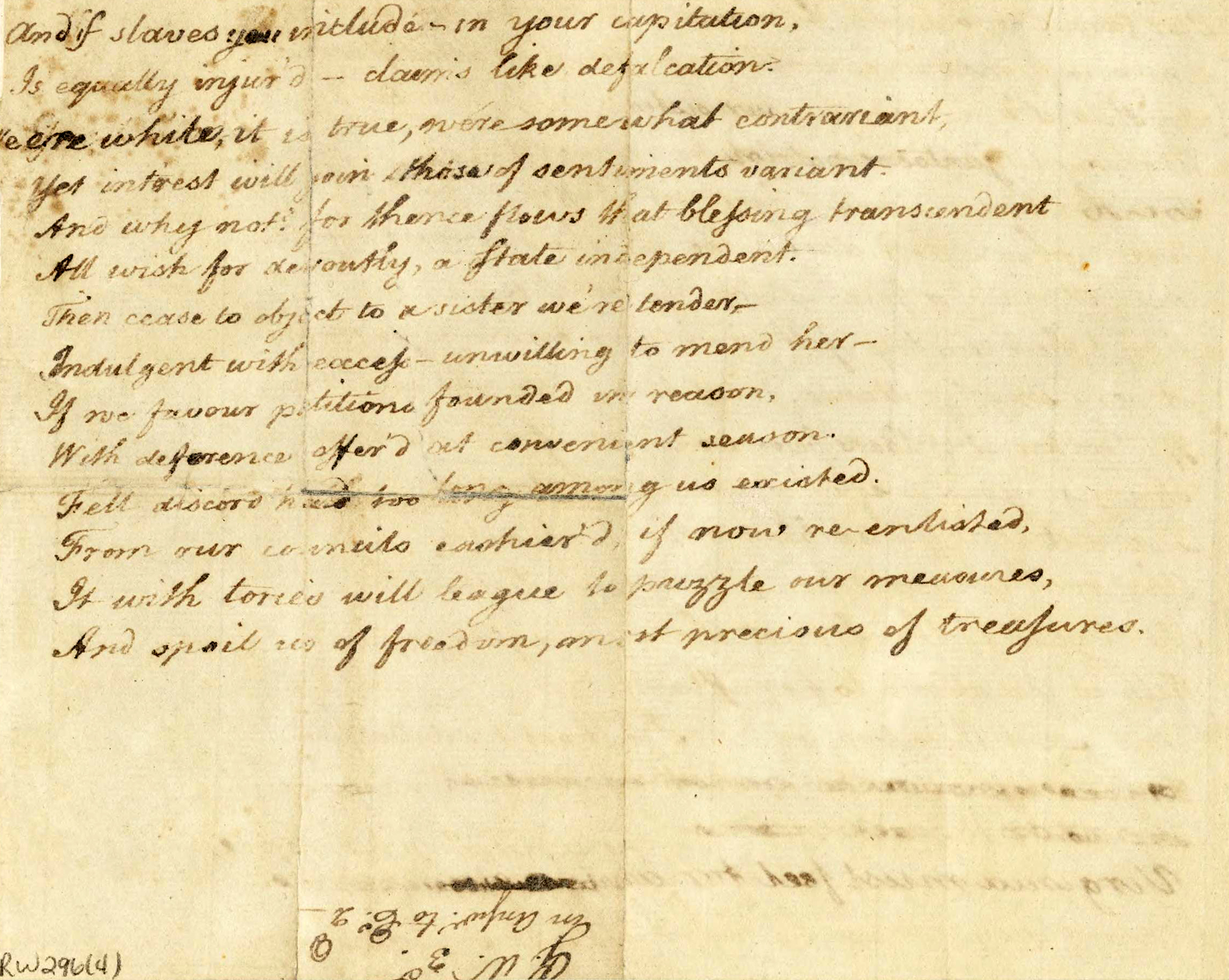 Page ten from Poems on Witty Subjects in Congress, from the Boston Public Library's American Revolutionary War Manuscripts Collection. |
With One Epigram, Though Well Hit Off" by George Wythe
|
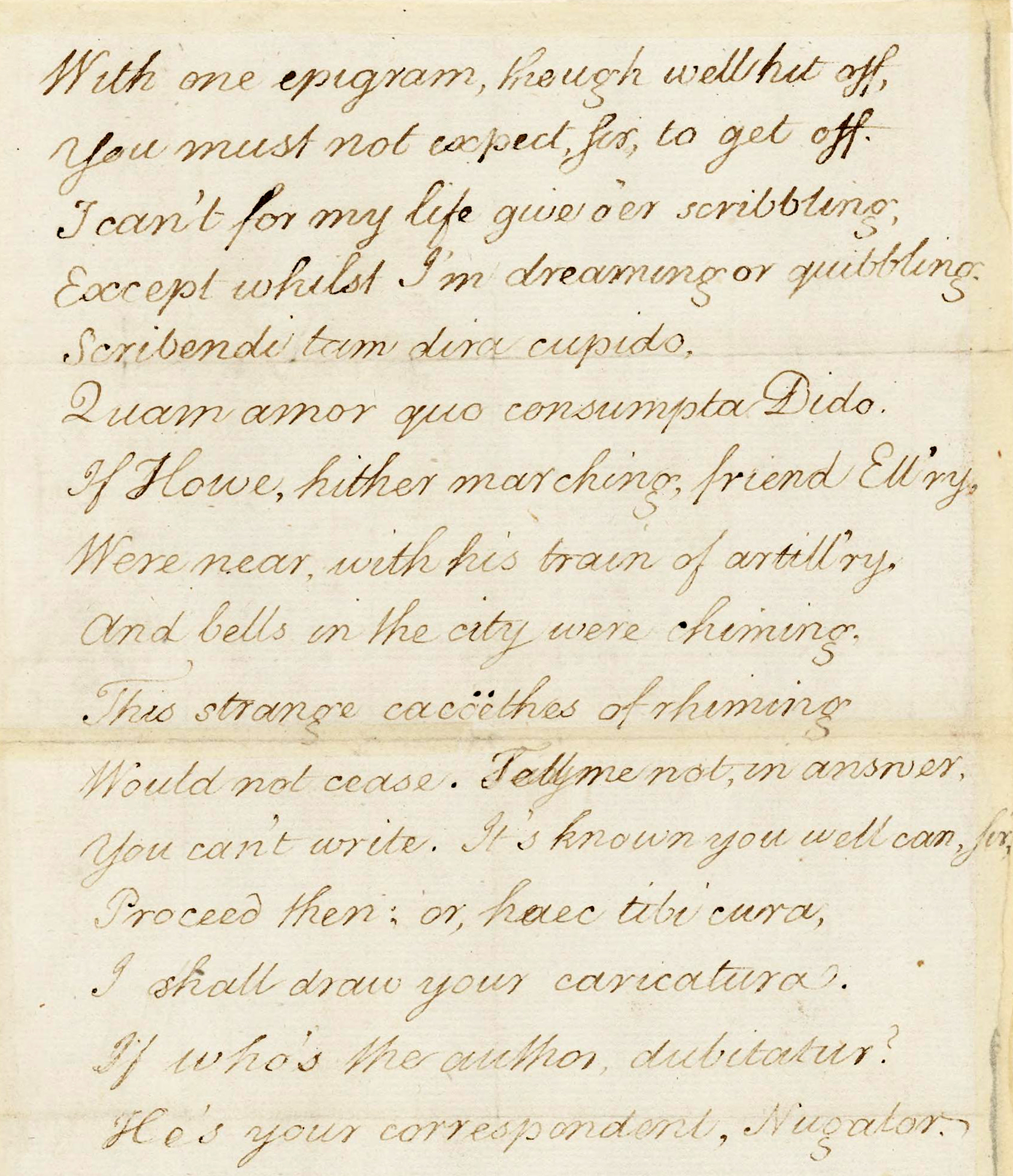 Page twenty-one from Poems on Witty Subjects in Congress, from the Boston Public Library's American Revolutionary War Manuscripts Collection. |
"Unless You Will Take One Line for Your Ten," by William Ellery
|
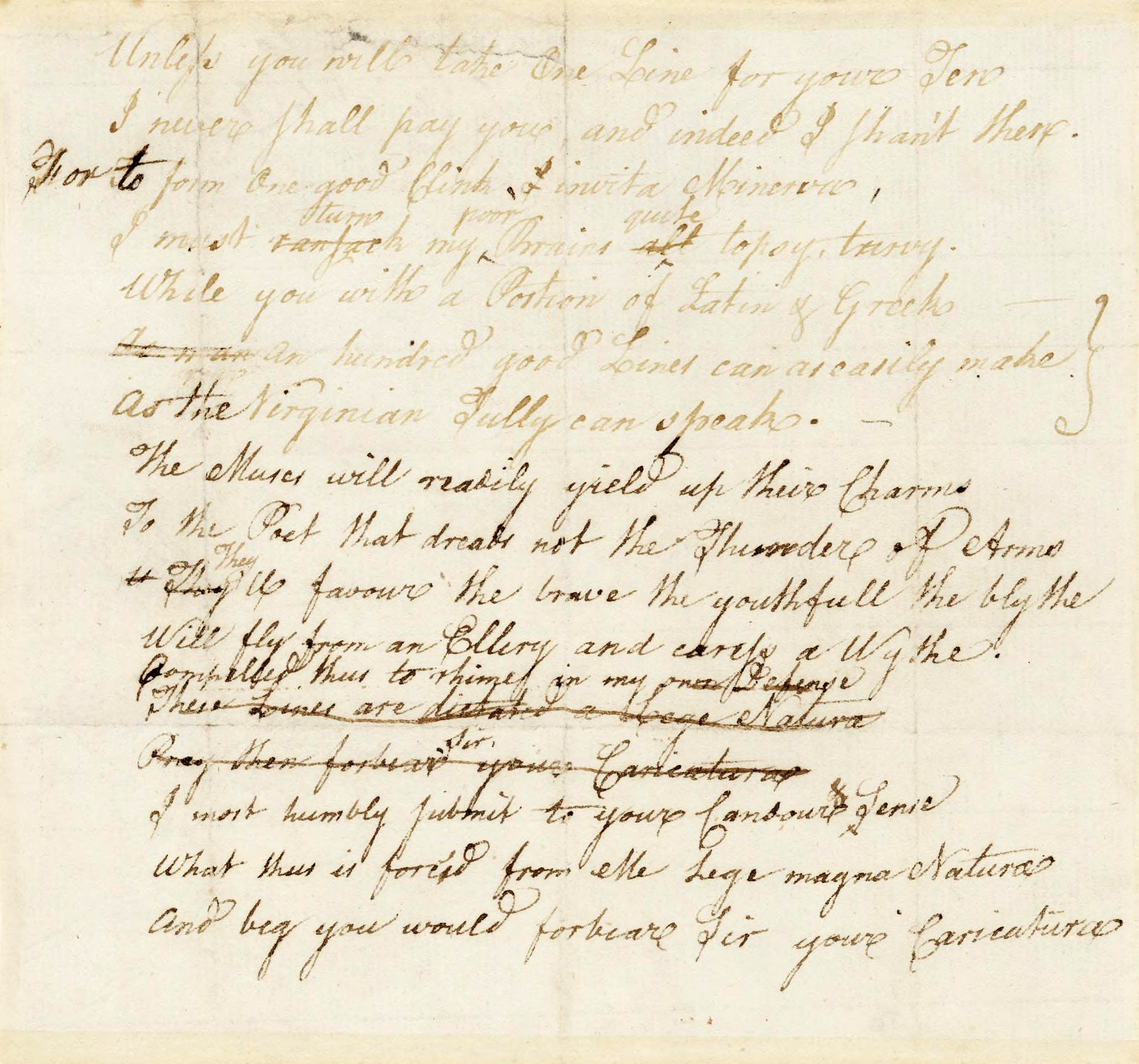 Page twenty-three from Poems on Witty Subjects in Congress, from the Boston Public Library's American Revolutionary War Manuscripts Collection. |
"You've Not only Quitted Your Arrear," by George Wythe
|
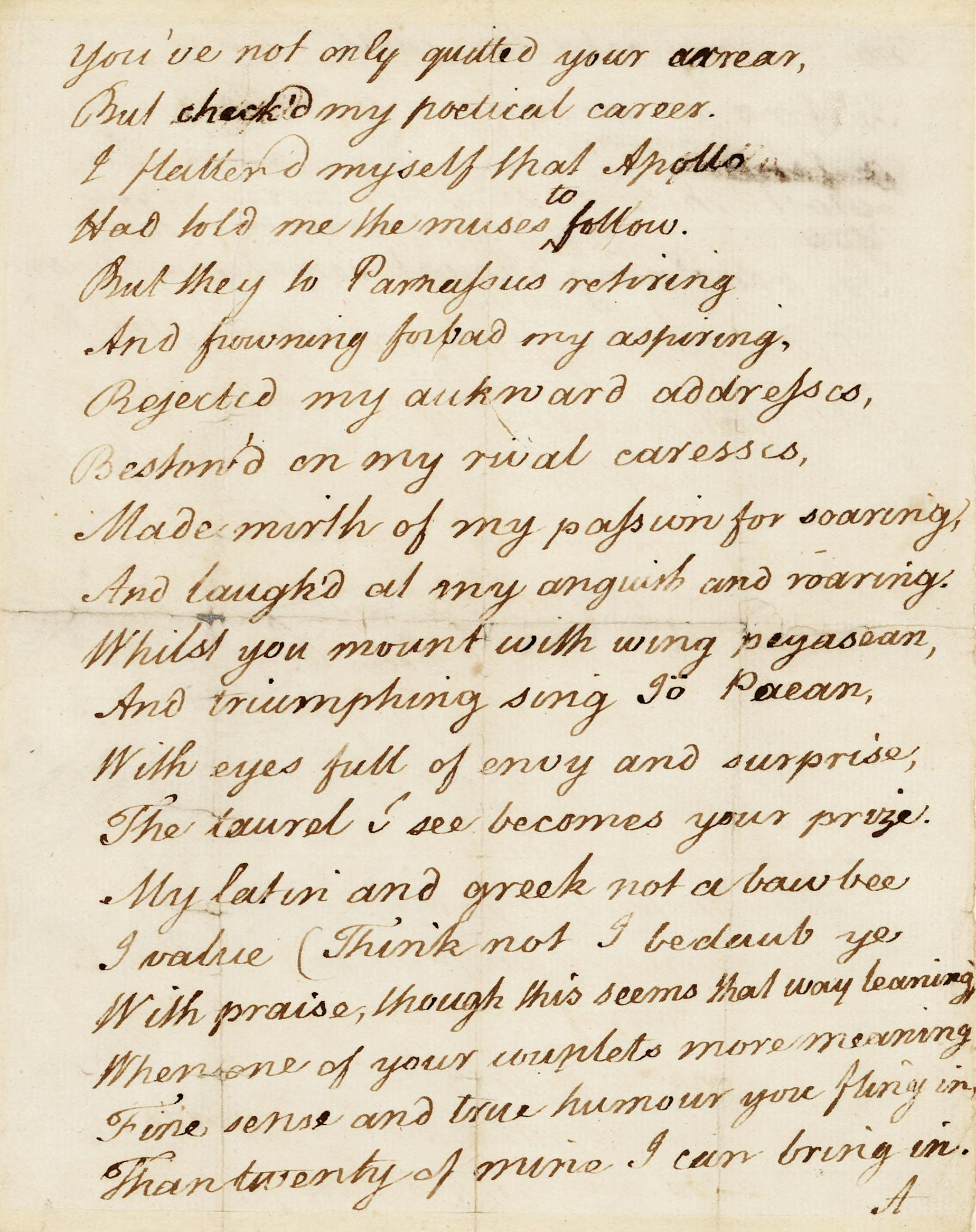 Page fifteen from Poems on Witty Subjects in Congress, from the Boston Public Library's American Revolutionary War Manuscripts Collection. |
|
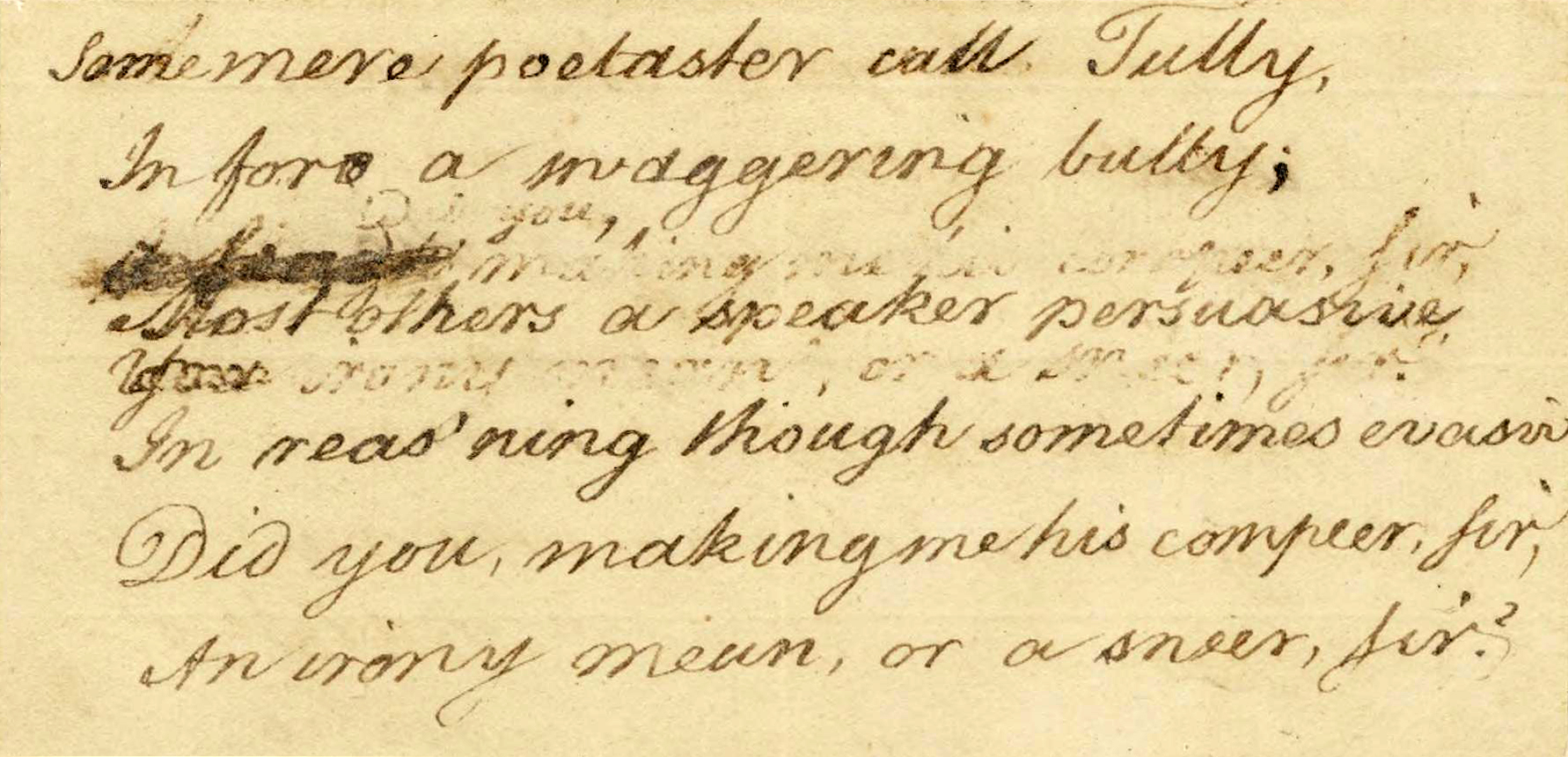 Page sixteen from Poems on Witty Subjects in Congress, from the Boston Public Library's American Revolutionary War Manuscripts Collection. |
"The Gen'rous Idea Your Last Piece Expresses," by William Ellery
|
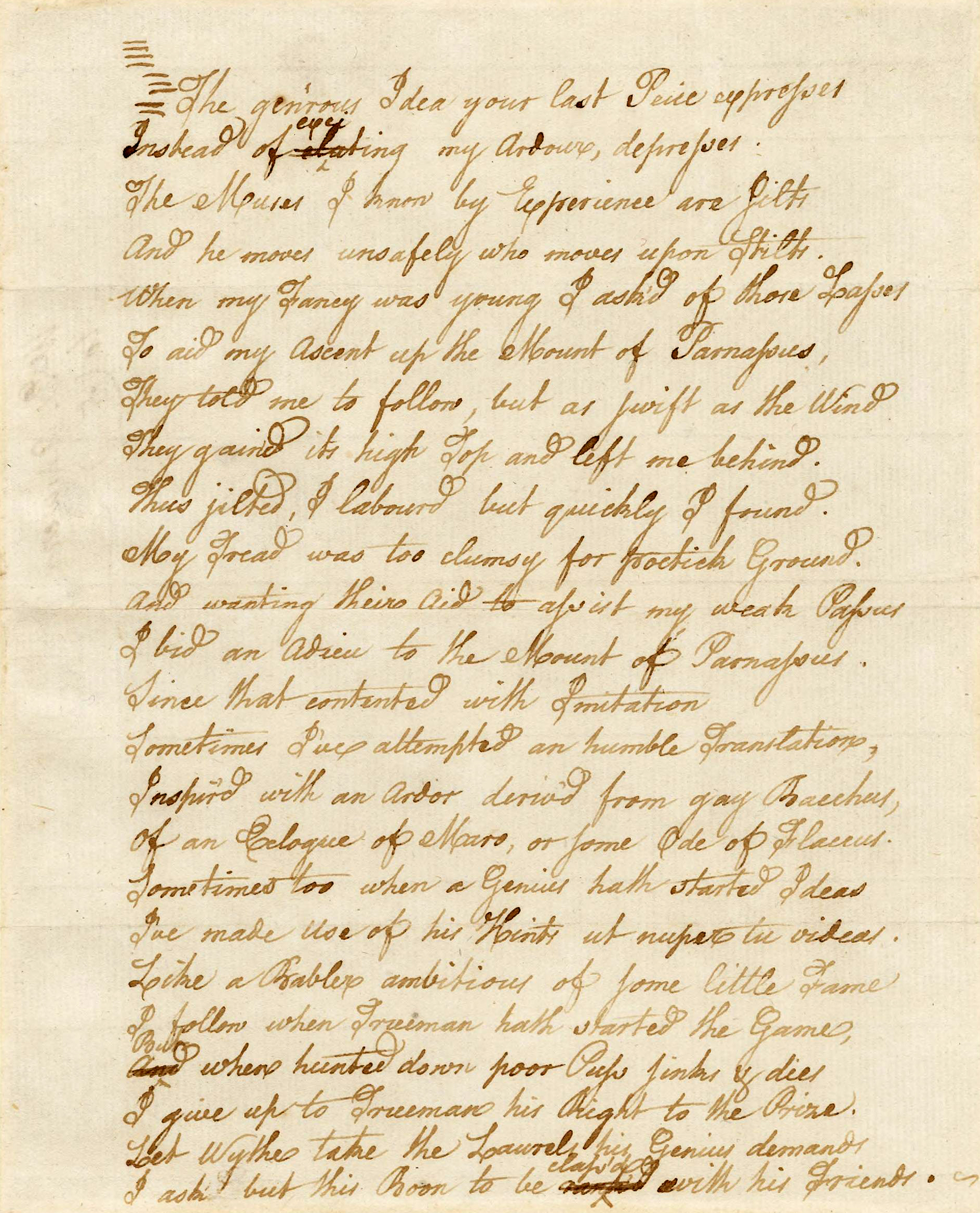 Page twenty-five from Poems on Witty Subjects in Congress, from the Boston Public Library's American Revolutionary War Manuscripts Collection. |
Copy of Ellery's epigram, in Wythe's hand
|
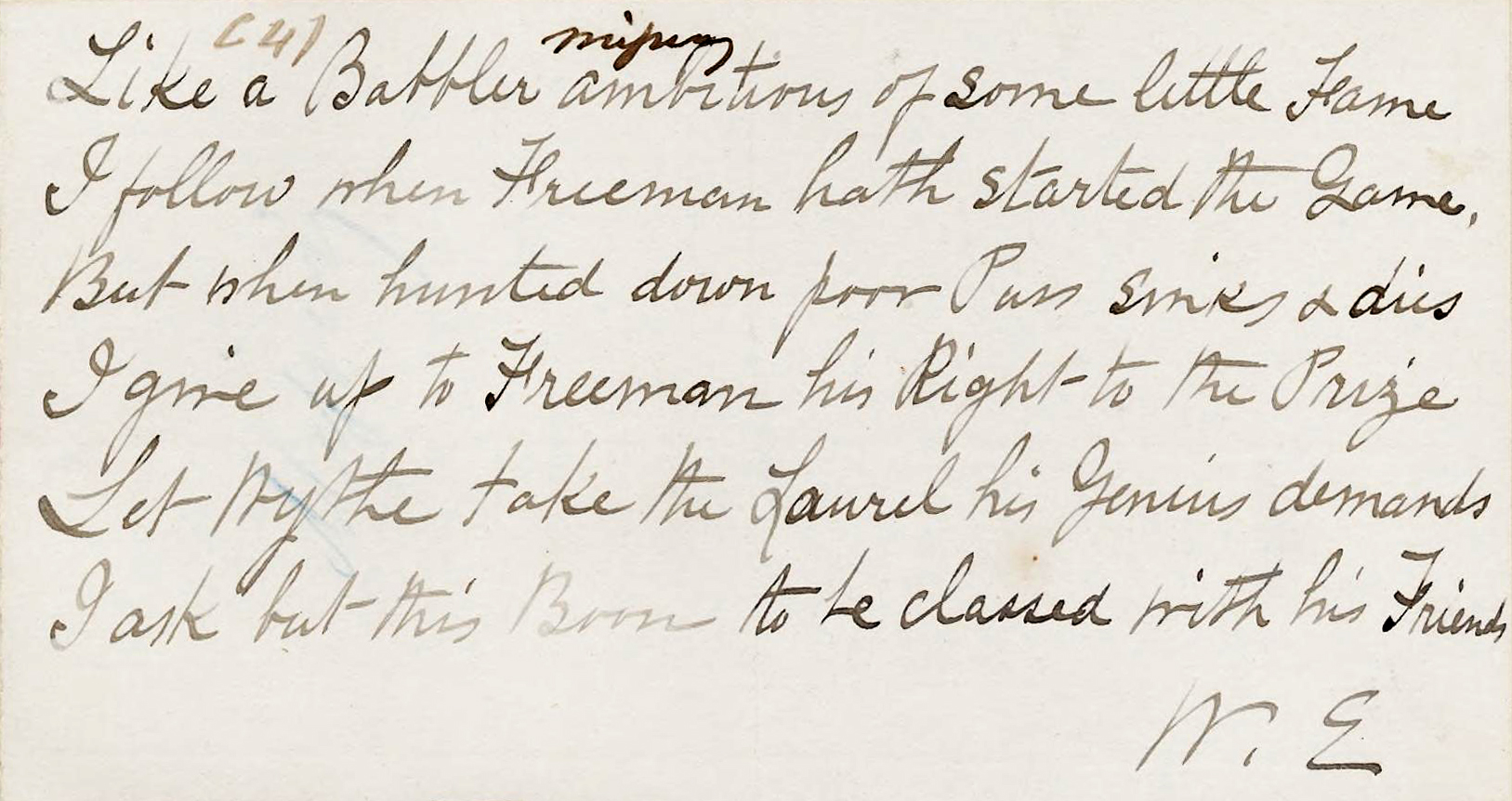 Page eleven from Poems on Witty Subjects in Congress, from the Boston Public Library's American Revolutionary War Manuscripts Collection. |
Martial, Epigram XVII, in Wythe's hand
|
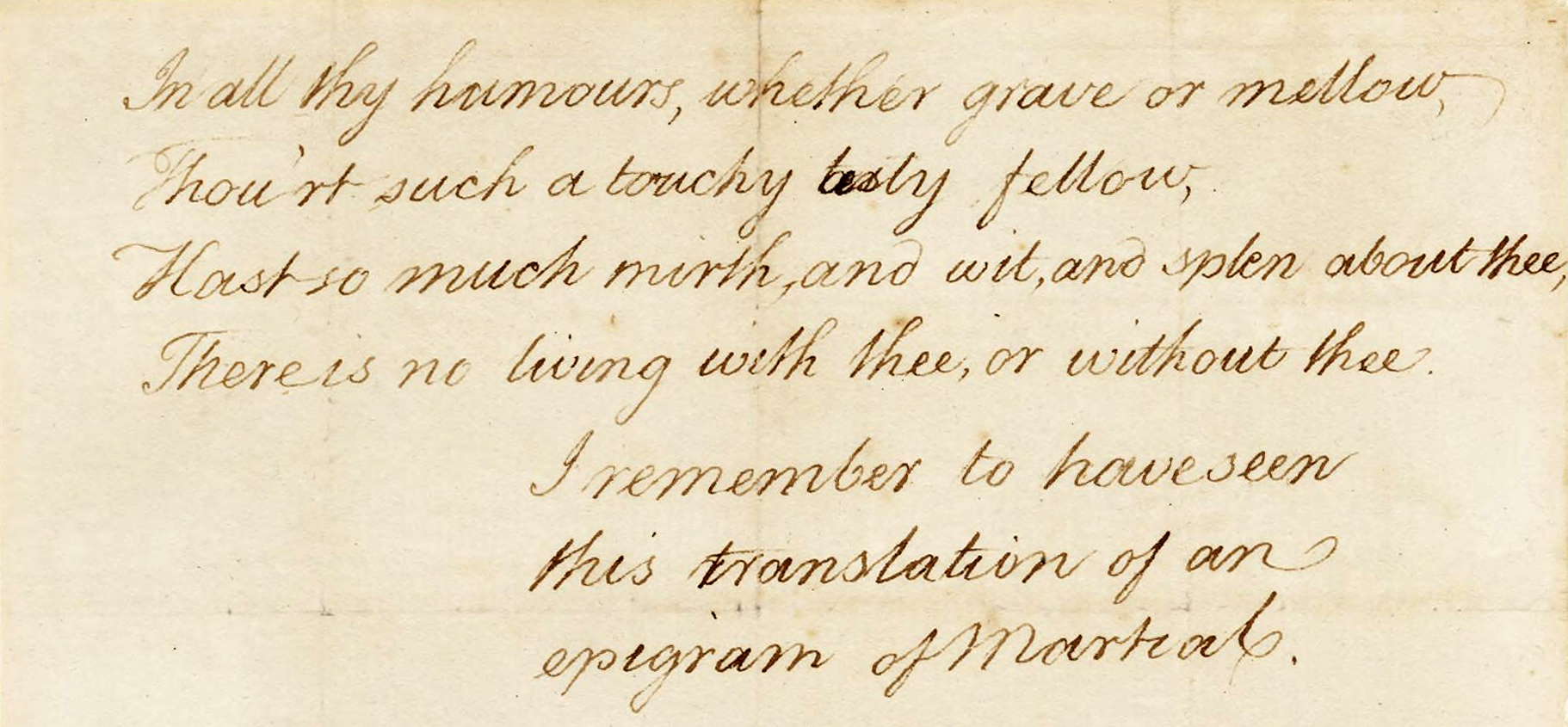 Page thirteen from Poems on Witty Subjects in Congress, from the Boston Public Library's American Revolutionary War Manuscripts Collection. |
"A Commissioner, to the People of Philadelphia," by William Ellery
In this poem, Ellery chastises the conservative position of Andrew Allen, delegate from Pennsylvania, for his commonwealth's reluctance to support independence from Great Britain. The first letter of each line spells out "ANDREW ALLEN" (emphasized here). Ellery apparently attempted to get the poem published, as there is another draft with the lines transposed to avoid obvious "libellus famosos" (libel), and a dialogue with a reluctant printer:
|
|
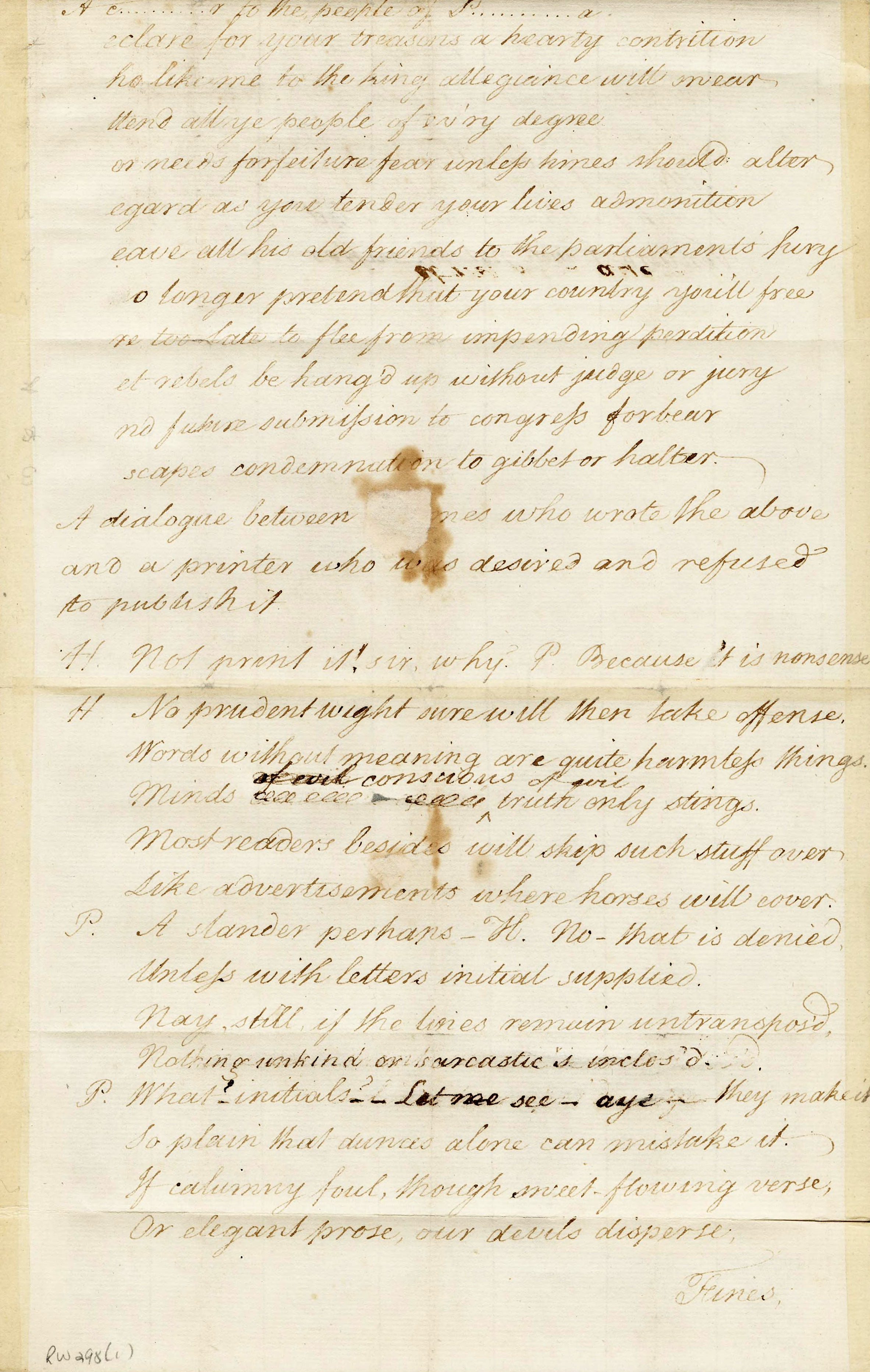 Page nineteen from Poems on Witty Subjects in Congress, from the Boston Public Library's American Revolutionary War Manuscripts Collection. | |
|
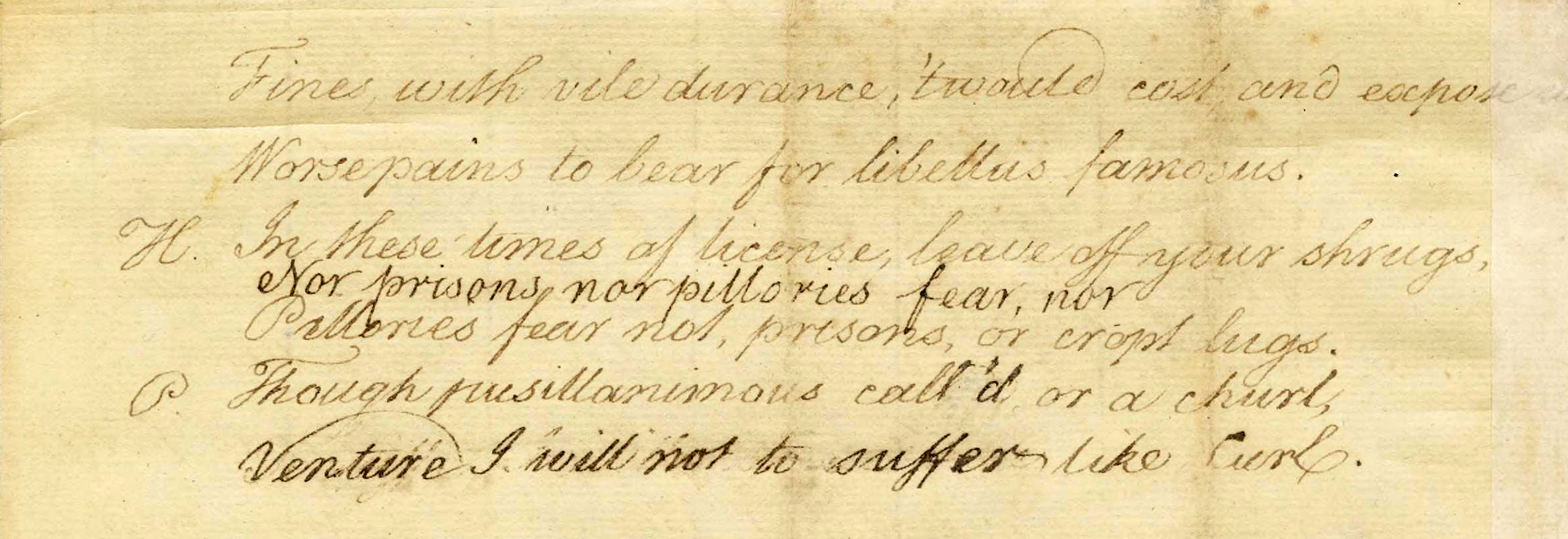 Page twenty from Poems on Witty Subjects in Congress, from the Boston Public Library's American Revolutionary War Manuscripts Collection. |
See also
References
- ↑ See W. Edwin Hemphill, "George Wythe Courts the Muses," William and Mary Quarterly 3rd ser., 9, no. 3 (July 1952), 338-345.
- ↑ "Novanglian": New Englander.
- ↑ "Dire desire to write," paraphrase of Virgil, Aeneid, Book V, line 721.
- ↑ "The love which consumed Dido," Queen of Carthage.
- ↑ General William Howe, (1729 – 1814), Commander-in-Chief of British forces during the American Revolutionary War, captured Philadelphia in September, 1777.
- ↑ Ovid, Ex Ponto III, xxxvi.
- ↑ Dubitatur: "It is doubted."
- ↑ Jester, clown.
- ↑ Defy nature, literally "go against Minerva's will." Cicero, De Officiis, I, 31, 110.
- ↑ Wythe is a Virginian Cicero: Marcus Tullius Cicero.
- ↑ A great law of Nature.
- ↑ Classical Greek cry of exultation or triumph, traditionally addressed to Apollo the healer.
- ↑ Bawbee: a Scottish half-penny.
- ↑ "As of late, you see."
- ↑ Libellus famosos: libel.
- ↑ A reference to the colonial punishment of cutting off ears?
- ↑ Edmund Curll (c. 1675 – 1747), whose name was synonymous with "unscrupulous publication and publicity."
External links
- Read these poems in the Internet Archive.
- Boston Public Library, Special Collections.
- American Revolutionary War Manuscripts at the Boston Public Library, Internet Archive.
